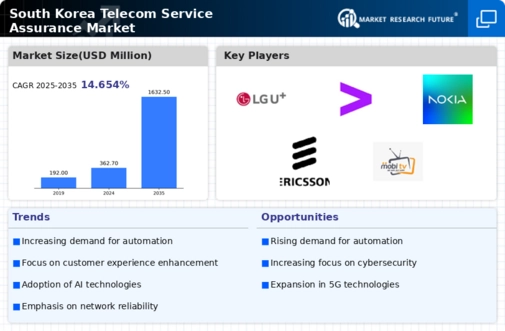Adoption of 5G Technology
The rollout of 5G technology in South Korea serves as a catalyst for the telecom service-assurance market. With 5G expected to cover over 90% of the population by the end of 2025, telecom operators face the challenge of ensuring seamless service delivery amidst increased data traffic and connectivity demands. The complexity of 5G networks necessitates sophisticated service-assurance solutions to monitor performance and troubleshoot issues in real-time. As operators invest heavily in 5G infrastructure, the telecom service-assurance market is likely to expand, driven by the need for enhanced monitoring capabilities and proactive management of network resources.
Growing Importance of Data Analytics
The increasing reliance on data analytics in the telecom sector is a significant driver for the telecom service-assurance market. Telecom operators in South Korea are increasingly utilizing data analytics to gain insights into network performance and customer behavior. As of 2025, approximately 70% of telecom companies are expected to integrate data analytics into their service-assurance strategies. This trend allows for proactive identification of issues and optimization of service delivery, ultimately enhancing customer satisfaction. The emphasis on data-driven decision-making is likely to propel the telecom service-assurance market, as operators seek to leverage analytics for improved operational efficiency and service quality.
Rising Demand for High-Speed Connectivity
The increasing demand for high-speed connectivity in South Korea is a primary driver for the telecom service-assurance market. With the proliferation of smart devices and the Internet of Things (IoT), consumers and businesses alike require robust and reliable network performance. As of 2025, approximately 95% of households in South Korea have access to high-speed internet, which necessitates advanced service-assurance solutions to ensure optimal performance. Telecom operators are compelled to invest in service-assurance technologies to monitor and enhance network quality, thereby improving customer satisfaction. This trend is likely to continue as the country aims to maintain its position as a leader in digital innovation, further propelling the telecom service-assurance market forward.
Increased Competition Among Telecom Providers
The competitive landscape among telecom providers in South Korea significantly influences the telecom service-assurance market. With multiple players vying for market share, companies are increasingly focused on differentiating their services through quality assurance. As of 2025, the market is characterized by a 20% increase in new service launches, compelling providers to adopt advanced service-assurance solutions to maintain service quality and customer loyalty. This competitive pressure drives investments in technologies that enhance network reliability and performance, ultimately benefiting consumers. The need for effective service-assurance mechanisms becomes paramount as providers strive to deliver superior experiences, thereby fostering growth in the telecom service-assurance market.
Regulatory Framework Supporting Telecom Innovations
The regulatory environment in South Korea plays a crucial role in shaping the telecom service-assurance market. The government has implemented policies that encourage innovation and investment in telecommunications infrastructure. As of 2025, regulatory support has led to a 15% increase in funding for telecom projects, which includes the development of service-assurance technologies. This supportive framework enables telecom operators to adopt advanced solutions that enhance service quality and operational efficiency. Consequently, the telecom service-assurance market is poised for growth as companies leverage regulatory incentives to innovate and improve their service offerings.
















